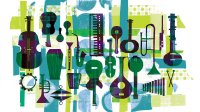Using Music During Instruction to Support Cognition
Teachers can incorporate music in their classrooms in a variety of ways to enhance the cognitive processes that are essential to learning.
Why is it easier to recall lyrics to a song than to memorize a poem? What is the power of emotional connections to some songs we remember years later? How does awareness of making progress in a musical instrument sustain academic learning effort?
In exploring the impact of music on learning, we find that when music is included and embedded across the curriculum, it can promote positive impacts on learning.
Music Provides Motivation and Improves Mood
Music can promote buy-in to topics of study, opportunities to recognize the power of effort to progress when learning a musical instrument, boost moods, provide memory-enhancing tools, and even expand the brain’s creative potential. We’ll explore some of the ways that incorporating music across the curriculum can impact mood, motivation, and memory:
- Music gives opportunities for students who are having a hard time in school to experience the emotional highs of progressive achievement.
- Knowing from the start that they will produce representations of the learning creatively can alleviate boredom in students and prevent them from giving low effort.
- Information acquired with positive expectation and then mentally manipulated through the symbolic representations of music can link into expanded neural networks for creative insights.
Dopamine Increases Pleasure in Learning
The dopamine-reward system enhances the experience of pleasure, satisfaction, and increased motivation and memory. The desire to seek the pleasurable response to dopamine release can be enhanced by music to facilitate motivated learning and enduring memory.
Teachers can promote positivity and perseverance by tapping into the power of the dopamine reward cycle. Incorporating dopamine boosters such as choice, optimism, movement, positive interactions with peers, being read to, acting kindly, expressing gratitude, humor, and listening to or playing music can keep brains engaged and receptive to learning.
There is evidence that dopamine activity in the brain’s reward areas increases with the pleasure of listening to music.
3 BENEFITS oF Music Incorporation
Music can boost interest about what is to come and bring greater enthusiasm to activities in which students participate.
1. Engagement/motivation. Incorporate music for joyful and powerful learning.
- Playing music that students enjoy as they move through many activities (such as creative writing, art, collaborative projects) encourages greater dopamine-enhanced experiences.
- As students enter the classroom, provide music related to the upcoming topic, such as a Strauss waltz as they are about to study Austria or jazz before a discussion of The Great Gatsby.
- Provide theme music from a game show, such as Jeopardy, before reviewing for a test.
2. Practice makes progress. Share with your students the following concept: “A process called neuroplasticity is ready to work for you to make your learning stronger and more useful. Every time your brain practices a skill or reviews new learning, the memories and actions strengthen.”
Awareness of their capacity to change their brains can be exemplified through past successes. Encourage students to reflect on their progressive success, such as when they learned to ride a bicycle, rapidly type on a computer or phone, or play a musical instrument. Explain that they actively practiced and that doing so improved their skills.
Teachers who understand the power of learners’ awareness of their abilities can incorporate this insight and use appropriate corrective measures and supportive feedback to recognize gradual, ongoing progress to desired goals and musical skill building. These experiences promote their connections, competence, and confidence that they are capable of building their understanding and skills—and that they are changing their brains in positive ways!
From their awareness of progress in playing an instrument to recognition of increasing skills in remembering a song, students experience the dopamine-reward satisfaction and sustained motivation from recognizing that their effort supports goal progress. For example, students can learn to play the recorder for appropriately leveled tunes with increasing difficulty.
3. Extended memory and creativity. Just as it’s easier to recall lyrics to a song than to memorize a poem and easier to recall those lyrics when you hear the music, students can increase their memory by putting information into a familiar tune, rhyme, or song. When movement, such as gestures, dance movements, or body position (turn left/right or moving to another place in the classroom), are used, they add another storage locker for the new information and further increase access to memory.
A study about the brain’s increased interconnectivity during musical improvisation is compelling: Skilled musicians were placed in a brain scanner and given a keyboard with the request to improvise new music. When they did so, their fMRI scans showed wide-ranging activation and extensive interconnectivity during periods of improvisation far beyond that displayed when performing known melodies.
Additionally, multisensory experiences that include music can extend wider-ranging brain connectivity. When information is learned, practiced, or applied through different senses (hearing, seeing, touching, moving), the memories are stored in multiple regions of the brain. This extended network of the information can then be accessed by way of any one of the sensory experiences through which it was incorporated. Incorporating musical experiences as part of learning may increase memory and potentially extend the brain’s interconnectivity of knowledge, promoting recognition of relationships that might not have otherwise been recognized—and in doing so promote creative insights.
What a wonderful opportunity we have to encourage students’ engagement, memory, and even experiences of delight from moments of insight. Including music across the curriculum can enrich the pleasure of learning and enhance memory. Music can also motivate students to engage with learning more joyfully and successfully, potentially expanding their learning into creative discoveries and innovations.
